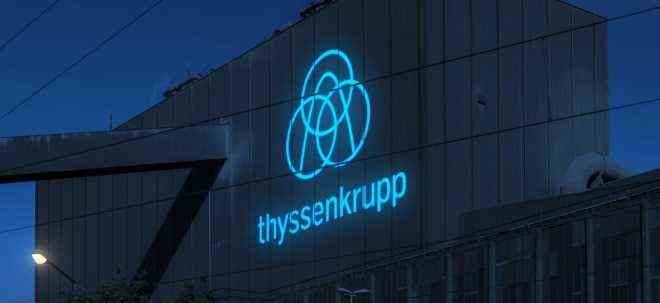The share had been reduced from around 15 percent to 7.9 percent, said the Swedish investor on Tuesday at the request of the financial news agency dpa-AFX. Cevian did not provide financial details of the transaction. At the close of trading, the share price fell by 6.11 percent to a good 10.60 euros compared to the XETRA closing price of 11.29 euros.
Cevian wants to remain one of thyssenkrupp’s largest investors and continue to support management in its course. “The latest figures now presented by thyssenkrupp and the increase in the share price reflect that the turnaround is showing success,” said the Swedes. thyssenkrupp had significantly improved its results in the past fiscal year 2020/21 (as of the end of September) and when the figures were presented last week, it promised a profit of billions for the current year. The largest shareholder is still the Krupp Foundation with a share of around 21 percent. She did not want to comment on Cevian’s move. “As an anchor shareholder, we will continue to be invested in thyssenkrupp,” said the foundation.
The Bloomberg news agency had already reported on the sale of Cevian the evening before, citing the documents it had. As a result, the financial investor offered more than 43 million shares in a price range from 10.20 to 11.29 euros and met with good demand. Based on the upper end of the range, the package would have a value of a good 485 million euros.
With this, Cevian also used the good run of the share in the past few months. In the course of the year, the paper increased by almost 30 percent following progress in the restructuring and the significantly better business figures. However, the price had dropped massively in value in recent years and had slipped to below four euros in the course of the Corona crisis in spring 2020.
In the end, however, it had gone up again. Martina Merz, who has been in office since October 2019, is currently turning every stone in the company. For example, the sale of the profitable elevator business last year put more than 17 billion euros in the tight coffers. Loss-making businesses have been sold or closed, and management is looking for buyers or partners willing to start in other areas. The whole thing is flanked by a comprehensive savings program that also provides for the loss of thousands of jobs.
Thyssenkrupp is currently aiming for an IPO for the promising hydrogen business. With a recently rumored possible valuation of up to five billion euros, Uhde Chlorine Engineers would not be worth much less than thyssenkrupp itself. The Essen-based company currently has a market capitalization of more than six billion euros, of which slightly more than four billion euros are in free float.
Cevian joined thyssenkrupp in 2013, initially with a little more than five percent. When the commitment became known, the papers had cost around 16 to 18 euros on the stock exchange. thyssenkrupp was in a deep crisis at the time, had previously taken on the task of building two steel plants in America, and as a result ran into financial difficulties. Cevian had expected a significant increase in value from the restructuring of the group that had begun and later increased the stake in capital increases.
At first it seemed to work: after progress in the reorganization of the group and the sale of the loss-making businesses in America, the share rose significantly and in the following years reached prices of almost 27 euros. But Cevian did not progress quickly enough and criticized it publicly. In the summer of 2018 there was a big bang, CEO Heinrich Hiesinger, who piloted Cevian on board in 2013, threw in the towel.
After that, thyssenkrupp never came to rest – several changes in strategy within the group reduced the shareholders’ trust in the Essen-based company. The capital-guzzling traditional steel business was at the center of this. A merger with the European part of Tata Steel, which had been prepared over the years, failed in 2019 due to the competition authorities, a planned split of the group was thus initially off the table. A short time later, thyssenkrupp parted ways with Hiesinger’s successor, Guido Kerkhoff.
The future of the steel division is currently still open. The management around Merz now wants to put the business on its own. A possible sale to the company Liberty Steel had previously failed due to different ideas of the two companies. Merz now wants to make the steel division competitive again on its own. In the end, there could be a spin-off or an independent subsidiary with its own financing, she had last said.
However, a final decision depends on a variety of factors. Among other things, according to Merz, planning security is required for the regulatory framework, especially with regard to the transformation to “green steel”, which requires high investments and which thyssenkrupp relies on political support.
ESSEN / STOCKHOLM (dpa-AFX)
More news on thyssenkrupp AG
Image sources: Quinta / Shutterstock.com, thyssenkrupp AG

